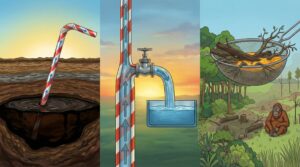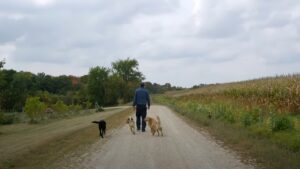
#72 | Frankly
What if Climate Change Was a Hoax?
Description
14.8% of Americans do not believe in climate change. Recently, a study mapping a 485-million-year history of Earth’s temperature and CO2 levels has been misinterpreted by some who downplay urgent climate concerns. Their argument suggests that, since the Earth has experienced much higher temperatures and CO2 concentrations in the past, the current rise of a few degrees won’t significantly affect us – and that climate concerns are being over exaggerated
What if climate change was, in fact, a “hoax”? What if all of the climate science developed in recent decades was a fraud? Could we then just generally exhale and continue humanity’s current economic trajectory unimpeded?
Exploring these questions in today’s Frankly, Nate emphasizes the limited, ‘narrow boundary’ perspective of downplaying the urgency of climate change. A more nuanced understanding of ecology reveals that the long-term stability of our planet depends on numerous environmental tipping points, with climate change being just one of them. Even if climate change was a “hoax”, we are still causing accelerating harm to the life support systems of Earth , pushing the biosphere beyond its limits in a way which will profoundly impact our future, even our near term future.
Support The Institute for the Study of Energy and Our Future
In French, we have a motto that says that a simple drawing is often better than a long explanation. Jean-Marc Jancovici Carbone 4 President
That’s very understandable because with left atmosphere thinking, one of the problems is that you see everything as a series of problems that must have solutions. Iain McGilchrist Neuroscientist and Philosopher
We can’t have hundreds and hundreds of real relationships that are healthy because that requires time and effort and full attention and awareness of being in real relationship and conversation with the other human. Nate Hagens Director of ISEOF
This is the crux of the whole problem. Individual parts of nature are more valuable than the biocomplexity of nature. Thomas Crowther Founder Restor
Show Notes & Links to Learn More
Download transcript00:05 – Study: A 485-million-year history of Earth’s surface temperature
00:50 – Stefan Rahmstorf, TGS Episode
02:08 – The sun is almost 50% larger and brighter than when the Earth formed
02:30 – Biodiversity now is the highest ever recorded + graph
02:42 – Prior extinctions caused by CO2 and volcanic episodes: end-Permian
02:50 – Approaching the end of the stability of the Holocene + graph
03:10 – Graph
03:43 – Correlation between GDP and materials
04:08 – Human-made mass outweighs all living biomass, and plastics outweigh animals
04:44 – 0.48% of human brain tissue is made up of microplastics
05:05 – Globally declining sperm count
05:14 – One in seven couples have difficulty conceiving
05:32 – The impact of temperature on fertility
05:36 – Endocrine-Disrupting Chemicals
05:44 – We are losing 1-2% of insect biomass per year + insect species decline graph
06:12 – Decline in bird populations graph + original study
06:50 – Alfred Russel Wallace
07:36 – We have lost 69% of wild animal populations since 1970
08:07 – Global biomass of wild mammals + changing distribution of world’s land mammals + global wildlife populations collapse
08:32 – Sea level rise
08:43 – Ocean deoxygenation
08:47 – Poleward movement of fish
09:16 – AMOC has slowed *15% (new data forthcoming)
09:36 – Ocean acidification
09:54 – Overfishing and peak fish
10:03 – Planetary boundaries





